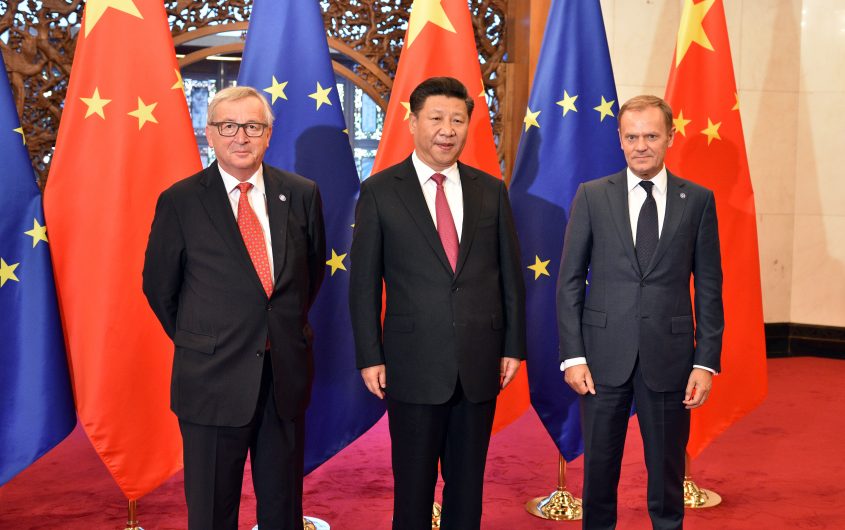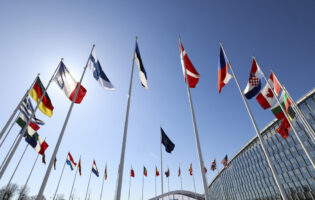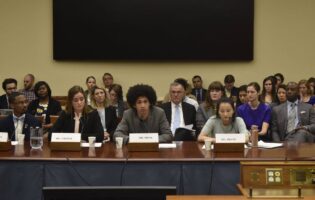
European External Action Service via Flickr
Misperceptions and Distortions

Klaus Larres
University of North Carolina in Chapel Hill
Klaus Larres is a DAAD/AICGS Research Fellow from February through April 2022. He is the Richard M Krasno Distinguished Professor of History and International Affairs at the University of North Carolina (UNC) at Chapel Hill. He served as a Counselor and Senior Policy Adviser at the German Embassy in Beijing, China. Larres is the former holder of the Henry A. Kissinger Chair in Foreign Policy and International Relations at the Library of Congress in Washington, DC, and a Member/Fellow of the Institute of Advanced Study (IAS) in Princeton, NJ. He also was the Clifford Hackett Visiting Professor of European History at Yale and a Fellow at the German Institute for International and Security Affairs (SWP) in Berlin, where he focused on German-Chinese relations. He was a Visiting Professor at Schwartzman College/Tsinghua University in Beijing, Tongji University in Shanghai, the Beijing Language and Culture University, as well as at Johns Hopkins University SAIS and the Woodrow Wilson Center in Washington, DC. He has held full-time professorial positions at Queen’s University Belfast and the University of London. He is also a non-residential Distinguished Visiting Professor at the Indian Institute of Technology (IIT) in Mumbai, India.
Larres has published widely on transatlantic relations, the Cold War, and U.S.-China-Europe relations in the 20th and 21st centuries. His latest books are entitled Uncertain Allies: Nixon, Kissinger and the Threat of a United Europe (Yale UP, 2022); Dictators and Autocrats: Securing Power Across Global Politics, ed. (Routledge, 2022); Terrorism and Transatlantic Relations: Threats and Challenges, co-ed. (Palgrave Macmillan, 2022); Understanding Global Politics: Actors and Themes in International Affairs, co-ed. (Routledge, 2020), German-American Relations in the 21st Century: A Fragile Friendship, ed. (Routledge, 2019); and many other books, including Churchill’s Cold War: The Politics of Personal Diplomacy (Yale UP, 2002), as well as many articles on U.S.-China-Germany/EU relations. He runs the Krasno Global Affairs & Business Council/Krasno Global Events Series at UNC and frequently contributes to the international media.
His DAAD/AICGS research project, “Breaking Up is Hard to Do: China as a Cause of German-American Tension in Transatlantic Relations,” will compare and analyze the different approaches the United States and Germany have taken in their relations with China since the early 2000s. The study explores why at times this has led to intense transatlantic disagreements and investigates whether or not different perceptions of the value of economic and political relations with China as well as historical experiences have been influential in both countries’ divergent views and strategies toward China. The study then explores how the fissure in German-American and transatlantic relations regarding China can be overcome.
How China, Germany, the EU, and the United States View Each Other in Times of War and Turmoil
Dealing with a dynamic and increasingly assertive China is one of the essential challenges of our times. There is only one country in the world which China views as its equal on all levels: the United States. However, China is also greatly interested in Europe. In fact, for several decades China has been convinced that it can make inroads with the European Union (EU) and perhaps wean the Europeans, and in particular Germany, away from the United States. While the war in Ukraine poses many challenges to China, Beijing also sees a number of opportunities that have arisen from the turmoil of the war, including U.S. distraction as well as the disruption of the global order. Based on the available literature and conversations with multiple sources in many countries, in the following, I will analyze the manifold challenges policymakers and their advisers must deal with from the point of view of both China and the West.
China’s interpretation of Europe’s national interest has led Chinese experts to believe in the correctness of the following three points:
- EU divisions: Beijing is convinced that divisions within the EU will increase over time and will work to China’s advantage. With the help of the Belt and Road Initiative and the 16+1 initiative, countries such as Greece, Poland, Slovenia, Italy, and above all Hungary are much more sympathetic to China than most other European states. Germany, the EU’s economically most important country, has also largely pursued pro-China policies during the last few decades. Still Germany, France, and the UK, to name but a few, have never been as uncritical and obedient to China than for example Hungary, Italy, and Greece, who often blocked tough EU statements and positions toward Beijing. Thus, China’s assumptions about intra-European divisions have proven correct in the past to a significant extent. Despite the current harmony within the EU and the western alliance, which the Ukraine War has brought about, Beijing is biding its time and remains convinced that in due course divisions within the EU and the Atlantic alliance will break out again. Regarding the recent Taiwan crisis and Nancy Pelosi’s controversial visit to Taipei, China has persuaded itself that the EU will not necessarily be on the side of the United States in any military conflict with Beijing over Taiwan. The EU’s strong economic interests in Asia will make them avoid supporting Washington, Beijing believes.
- The EU’s relations with the United States: Beijing believes that the United States treats the Europeans as underlings and that eventually the EU countries will have enough, declare their transatlantic independence, move closer to China, and perhaps even abandon the close alliance with the United States altogether. For China, French President Macron’s statements about the urgent necessity to develop Europe’s “strategic autonomy”—first in his Sorbonne speech of September 2017—point in this direction as does Germany’s cautious sympathy with Macron’s thinking. Macron’s ruminations about not humiliating Russia and trying to achieve an end to the war in Ukraine as soon as possible, even with Putin at the time being in possession of well over 10 percent of Ukrainian territory, seems to indicate to China that the EU is gradually becoming more geopolitically independent from the United States. The Biden administration, after all, does not support Macron’s strategy.
- Democratic chaos in the West: China is also astonished about the chaos and mess in many of the world’s democracies, including and in particular in the United States. The increasing polarization of U.S. politics and society during the Trump years—not least the storming of the Capitol on January 6, 2021—and since then has come as a great surprise to China. It confirms Beijing’s belief that the 21st century is China’s for the taking and that the West’s global power is rapidly declining. The “Washington consensus,” it appears to Beijing, is not holding together much longer as a role model for the global order of the future.
Beijing’s interpretation is rooted in a clear but also rather distorted real-political analysis of world affairs, which itself is based on China’s strongly held geopolitical and geoeconomic convictions. The historical-cultural dimension of transatlantic relations frequently tends to be sidelined or neglected in Chinese thinking. Moreover, as a fairly well-run and strictly hierarchically organized autocratic power, Beijing misreads the democratic chaos in many western countries, exaggerating its meaning and importance while interpreting it as mere weakness and decline. Beijing genuinely believes that the western world will disintegrate and break up in the near- to mid-term future.
Germany’s important role
For Beijing, “Germany is the core country of the European Union and has a leading role.” For political, economic, and technological reasons, Beijing is greatly interested in developing ever-closer relations with Berlin while the governments of Germany and many other EU member states have remained largely passive when during the last two decades, in particular since China’s 2001 accession to the World Trade Association (WTO), many of their crucial export industries—such as the automobile sector and the chemical industry— have become highly dependent on China’s huge market. These developments in turn have led to often fairly conciliatory and benign China policies in Germany, which during the last decade and more have caused much concern in the United States.
From a hard-nosed real-political strategic analytical angle, Beijing sees no convincing reason why in principle Germany and the EU’s “benign” or soft approach to trade and economic relations with China should not continue, despite some temporary setbacks and crises. After all, Beijing is well aware that, for example, Germany’s strong economic performance and its economic leadership role in Europe are essentially based on three components:
- Technological superiority: Germany’s competency and ability to continue to innovate technologically in a number of important fields (such as engines, machine tools, chemicals, pharmaceuticals, etc.), as well as the country’s engineering creativity, are a pillar of Germany’s economic performance. These are of course exactly the elements that China appreciates and why it is keen on close relations with Germany.
- Cheap natural resources: Germany’s economic power and wealth are also based to a significant extent on the availability of cheap resources such as coal, oil, and gas—not least from Russia.
- Importance of the Chinese market: Germany’s economic performance, wealth, and high standard of living since the mid-2000s—once the profound economic impact and consequences of unification had been gradually overcome—have been increasingly built on the accessibility of the huge Chinese market for German goods. German automobile producers, tools and machinery manufacturers, and chemical industry could hardly flourish without the availability of the Chinese market.Moreover, in contrast to the United States, Germany and the EU never had diplomatic relations with Taiwan, and they do not view themselves as global powers. The Europeans thus do not perceive themselves as being involved in a battle for global hegemony with China and are consequently much less emotionally involved in disputes with China over Taiwan and the South China Sea. Thus, any trade and economic conflicts between the Europeans and China tend to be much less intense than the equivalent conflicts between Beijing and Washington.
China was therefore much less surprised than the United States and other western countries regarding new German Chancellor Scholz’s initial hesitation and reluctance to deliver heavy weapons to Ukraine. Yet, Scholz changed this policy abruptly in his major Zeitenwende speech to the German parliament on February 27, 2022. However, German reluctance to become too directly involved and attempts at not becoming totally estranged from Moscow continued well beyond this speech. In view of Germany’s dependence on Russian gas and oil, this made a lot of sense from China’s real-political perspective. In the Chinese view, Scholz’s U-turn in late February came about largely due to U.S. pressure on Berlin.
Angela Merkel’s cautious and constructive policy of engagement with China also made a lot of sense in the Chinese worldview. Germany, the Chinese are convinced, simply is too dependent on the Chinese consumer to endanger relations with Beijing too much. It is generally believed in China that despite the EU’s hardening stance toward China, which is fully shared by official Germany, Scholz will pursue a similar China policy to Angela Merkel’s. To some extent, Germany continues to be seen in Beijing as a bridge between China and the western world.
China’s deteriorating public image and the war in Ukraine
China’s image in Europe has greatly declined recently. This is above all due to Xi Jinping’s development of an ever more fully-fledged autocratic surveillance state in China,[1] the imprisoning and ruthless coercion meted out to many Muslims in Xinjiang, and—much more recently—Beijing’s support for Russia’s invasion of Ukraine. Any initial hope that China might try to use its good offices in Moscow and Russia’s dependence on China’s geopolitical and economic support to mediate in the conflict has proven to be illusionary.
What are the major reasons for China refusing to mediate publicly in the war in Ukraine? There are four main reasons:
- Russia is China’s only powerful and influential geopolitical partner. Both countries support each other in the UN Security Council, have embarked on ever closer militarily relations, including joint maneuvers, and share a similar global outlook. Russia, however, is clearly the junior partner, and Russian and Chinese interests overlap and rival each other in the Caucasus, Siberia, and other areas. In the mid-term future, it is questionable whether the pseudo-alliance that has evolved between the two countries can maintain its momentum. It may even disintegrate again.History can be a guide here. The initial close Stalin-Mao relationship broke up in the early 1960s and by the late 1960s had even led to Chinese-Soviet border clashes. This allowed U.S. President Nixon to embark on his “triangular diplomacy” a few years later, which dislodged the two powers from each other and played them off against each other (while the Chinese, of course, thought they were playing off the Soviet Union and the United States against each other).[2]
- Russia’s ability to provide China with resources such as gas, oil, coal, wheat, and other agricultural products is immensely valuable for Beijing. A large oil pipeline from Russia to China is under construction and should be completed by 2025 at the latest. Beijing has no intention to endanger access to these important resources by criticizing Putin’s war or mediating between the combatants.
- Under Xi Jinping, China’s belief in the possibility of replacing the United States as the primary global power on earth has grown, and animosity to U.S. global influence and norm-setting ability has increased. China and Russia share this strong anti-American resentment. They also have this attitude in common with many developing countries in Africa and Asia, and several in the Middle East, while other powers, such as India—but also NATO member Turkey—sit on the fence and declare themselves more or less “neutral” in this new U.S.-China power battle. For both China and Russia, the Ukraine war is a decisive phase in undermining U.S. global power. It may even provide them, they believe, with the possibility of “getting rid” of overwhelming and stifling U.S. global influence and domination.
- China has a strong aversion to being humiliated and losing face in public. Any mediation efforts always bear a high risk of failure. It would be difficult for the Xi Jinping regime to accept failure in any attempt at mediation in the Ukraine war and explain any lack of success to their own populations who, after all, are used to the rhetoric of success and wisdom of their communist leaders. It is therefore unlikely that China will embark on any formal mediation efforts.Due to its strictly real-political interpretation of global affairs, China, however, is not too concerned that its tentative support of Russia in the Ukraine war will have serious repercussions for its trade and economic relationships with Germany and other European countries. Instead, policymakers in China are convinced that any resentment and cooling of trade relations will only be temporary.
Rising western disenchantment with China
Yet, western disillusion with China has become quite pronounced for the last decade or so, in particular since Xi Jinping came to office in 2012/13. A certain “turning point” occurred in 2015/16 when western disenchantment with China’s increasingly assertive policies led to real consequences and began to shape western policies toward China. It was the industrial plan “China 2025” that shocked German and EU policymakers. Beijing was surprised by this reaction though the Chinese blueprint largely imitated Germany’s industrial plan “Industry 4.0” and focused on the same ten technologies Berlin had identified as crucial for maintaining Germany’s leading industrial role.
China’s investment binge in Europe and the United States in 2016 and Beijing’s finely targeted purchase of western high-tech knowledge companies, such as German robotics company Kuka and home appliance maker Midea, led to a changed attitude in Germany and other western countries. “Digestion, absorption, and re-innovation” of German technology is what Beijing had in mind, it seemed. In the United States, China’s increasing militarization of the rocks, reefs, and uninhabited islands in the South and East China Seas was noticed with much concern. After all, Xi’s promise to Obama in the Rose Garden of the White House in September 2015 that China would do no such thing was exposed as an outright lie.
Thus, from 2015 and due to China’s increasingly assertive policies, a certain overlap, if not merging, of the U.S. and European approaches to China occurred. Eventually, in a 2019 policy paper, the EU Commission, with strong German support, referred to China as a “systemic rival” and thus “dramatically sharpened its political stance against China.” Ratification of the initially much-heralded Comprehensive Agreement on Investment between the European Union and China in December 2020 was soon put on hold in response to China’s retaliatory sanctions slapped on EU officials and parliamentarians for having criticized Beijing’s policy in Xinjiang.
The EU’s new Strategy for Cooperation in the Indo-Pacific, launched in mid-September 2021, went further still. It emphasized that the EU, including Germany, is determined to have a “long-term” engagement with the region and will even establish an “enhanced naval presence” in the Indo-Pacific. After all, 30 percent of all European trade with Asia passes through these international waters, which China largely claims as its own national territorial waters. Nevertheless, the EU, including Germany, as the Frankfurter Allgemeine Zeitung argued, does not wish to get into an “open confrontation” with China. While protecting “its essential interests” and “pushing back where fundamental disagreements exist,” Brussels intends to continue pursuing “its multifaceted engagement with China” and cooperating “on issues of common interest and encourage China to play its part in a peaceful and thriving Indo-Pacific region.”
In view of Germany’s economic dependency on China, it is hardly surprising that all German governments, including the ones led by Angela Merkel for sixteen years and the successor coalition government led by the SPD’s Olaf Scholz, have been keen on de-emphasizing confrontation.
This well-intentioned but rather ambiguous and still perhaps somewhat naive attitude, which appears to continue giving China the benefit of the doubt, remains characteristic of European and German attempts to avoid too much criticism of China. Berlin, for one, does not wish to endanger its continuing “economic special relationship” with Beijing.
For European countries, the lure of the huge Chinese market remains formidable, especially for Germany.[3] Moreover, until the Ukraine War, Ostpolitik still had a powerful influence on German foreign policy, not least within the Social Democratic Party (SPD). It was based on the conviction, heralding from the policy of the 1960s and 1970s toward Moscow, that political, economic, and cultural engagement with autocratic powers rather than confrontation can make them change their behavior and turn them into more responsible international actors.
In view of this and Germany’s economic dependency on China, it is hardly surprising that all German governments, including the ones led by Angela Merkel for sixteen years and the successor coalition government led by the SPD’s Olaf Scholz, have been keen on de-emphasizing confrontation. They often have adopted a conciliatory approach toward Beijing,[4] despite this frequently leading to severe disagreements with Washington. Moreover, the overblown and overly harsh policies of the Trump administration toward China as well as Trump’s simultaneous anti-EU and anti-NATO policies antagonized much of Europe and did not help to bring about a united western policy toward China.[5]
Consequently, in the years 2017-20, the disagreements between the EU and the United States about how to deal with China’s rapid and increasingly assertive global rise escalated. The gradual transatlantic re-alignment regarding China of the years 2015-16 dissolved again into renewed acrimony, which lasted for the better part of Donald Trump’s one-term presidency. The war in Ukraine, however, has led to the opposite and has renewed western determination to confront not only Russia’s aggression against Ukraine but also China’s assertive global economic and geopolitical policies.[6]
Outlook
The war in Ukraine and the Biden administration’s skillful transatlantic policies have ensured that the western world has largely become united in the conviction that an aggressive Russia needs to be confronted and that China ought to face a much more determined and self-confident western policy than hitherto. The development of the QUAD (United States, India, Japan, Australia) and the AUKUS treaty (United States, United Kingdom, Australia) have become important instruments in the security area. China, after all, is developing its second large naval base abroad in Cambodia and has recently launched its third highly modern aircraft carrier.
The Biden administration’s May 2022 initiative to set up an Indo-Pacific Economic Framework (IPCF) with so far twelve members and the consideration in Washington to join the 2018 Comprehensive and Progressive Agreement for Trans-Pacific Partnership (CPTPP) are creative economic initiatives to counter China’s influence in the Indo-Pacific. The CPTTP was developed in response to the Trump administration’s rather unwise withdrawal from the Trans-Pacific Partnership (TPP), signed in 2016 but never ratified.
It will require western unity, however, if the challenges from China are to be managed successfully and without creating further global instability and war.
Moreover, the September 2021 creation of the TTC (the U.S.-EU Trade and Technology Council) to “provide a framework to promote cross-agency, whole-of-government coordination on U.S. and EU approaches to key global trade and technology issues” is a creative instrument to deal with not least the economic and technological challenge from China on a transatlantic level. Clearly, at an early stage in Joe Biden’s presidency, his administration decided that it was high time that the United States got involved again more actively both in the Pacific and in Europe, instead of leaving the playing field to China.
China, however, is not standing idly by. In September 2021, Beijing submitted its own membership application for the CPTPP. And already in November 2020 China and fourteen Asia-Pacific nations signed a trade deal called the Regional Comprehensive Economic Partnership (RCEP) to enhance its economic influence in the Pacific area. Beijing has also created a number of well-functioning banks to provide developmental loans on a global scale (such as the Asian Investment Bank, AIB). And despite some recent setbacks, Beijing continues to view its global Belt and Road Initiative (BRI) as well as the 16+1 initiative in Europe as promising vehicles to expand its economic and geopolitical influence.
But as always, the devil is in the detail. How to precisely develop further the controversial BRI, 16+1, and RCEP, as well as manage the relationships with Russia and, above all, with Taiwan without provoking a major war pose a big challenge to China. The West is faced with a similar dilemma.
How to simultaneously deal with Russia’s military aggression in Ukraine and address China’s much more global geopolitical and economic challenges are contentious, unresolved questions among the western allies. These challenges have already led to an increase in simmering tension and discontentment in the western camp. It will require western unity, however, if the challenges from China are to be managed successfully and without creating further global instability and war.
[1] Kai Strittmatter, Die Neuerfindung der Diktatur. Wie China den digitalen Überwachungsstaat aufbaut und uns damit herausfordert (Munich: Piper, 2020).
[2] William P. Bundy, A Tangled Web: The Making of Foreign Policy in the Nixon Presidency (New York: Hill and Wang, 1999). See also Klaus Larres, Uncertain Allies: Nixon, Kissinger, and the Threat of a United Europe (New Haven, CT: Yale University Press, 2022).
[3] Edward Luttwak, The Rise of China vs. the Logic of Strategy (Harvard UP, 2012). Robert Blackwill and Jennifer Harris, War by Other Means: Geo-economics and Statecraft (Harvard UP, 2016).
[4] Klaus Larres, “Angela Merkel and China: Trade, the U.S., the South-China Sea, and the Continuation of ‘Ostpolitik,’” CPG Online Magazine (Thammasat University, Bangkok), Issue No.6 (November 2015), pp.42-51: https://www.cpg-online.de/2015/11/01/angela-merkel-and-china-trade-the-u-s-the-south-china-sea-and-the-continuation-of-ostpolitik/.
[5] Klaus Larres, “Angela Merkel and Donald Trump: Values, Interests, and the Future of the West,“ German Politics, Vol.27/2 (June 2018), pp.193-2012. See also Klaus Larres, “Trump’s Trade Wars: America, China, Europe, and Global Disorder,” Journal of Transatlantic Studies, Vol.18/1 (February 2020), pp.103-129.
[6] For a well-analyzed new paper, see Ian Bond et al., Rebooting Europe’s China Strategy (Berlin: SWP/GIISA, May 2022), https://www.swp-berlin.org/publications/products/sonstiges/2022_Rebooting_Europes_China_Strategy.pdf.
Supported by the DAAD with funds from the Federal Foreign Office (FF).









